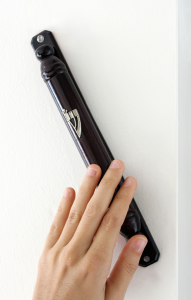The letter shin on the Mezuzah case is reflective of one of the Names of G-d, Shadai. It is written on the back of the Mezuzah parchment and begins with the letter shin. The letter shin on the case is reminiscent of that name (Some mezuzah cases don’t have a shin, rather they are open in that spot, showing that Name of G-d directly). On the inside of the Mezuzah are the two paragraphs of the Shema, and on the back, that particular Name of G-d. This needs explanation.
One reason that Name is written on the outside, explain the Rabbis, is to hint that G-d promises to protect and watch over the home of a Jew who affixes a Mezuzah on his doorway. The Talmud says that our King stands outside our homes and protects us, unlike a mortal king whose subjects stand outside his palace and protect him!
This is hinted to in the letters of the that Name, shin, dalet and yud, standing for “Shomer dalsos Yisrael“, or “Guardian of the doorways of the Jews.”
There is another, deeper meaning to this as well. The Talmud says that one of the meanings of the name Shadai is an acronym for “she’amar le’olamo dai“, “He said to His world ‘enough!” Because at the time that G-d was creating the universe, the heavens were expanding without an end, until He expressed anger at them and said “dai.” enough! (The expanding universe!)
The meaning of this is that the creation of G-d, Who is infinite and perfect, innately strives to achieve infinity and perfection. G-d, however, did not want to create a perfect world. He desired an imperfect world in order to leave room for man to partner with Him in perfecting the universe, which is our part in “tikkun olam,” enhancing the world. If it was already perfect, we would have no purpose and have no way of earning reward.
The first mitzvah Abraham was commanded was bris milah, the circumcision. It was proceeded by G-d telling him “I am E-l Sha-Dai go before me and be complete.” This is the first tikkun of an imperfection, to remove the foreskin, manifesting our partnership with G-d’s Name of Sha-Dai.
Ultimately, the prime place in the world where a Jew perfects the world is in the Jewish home. That is the place where we sanctify the mundane, elevating all of our everyday life activities to the holy and sublime by living our lives according to the laws of the Almighty. The Jewish home, much more than the synagogue, is the pinnacle of a Jew’s tikkun olam. We are reminded of this every time we walk into our doorways, by the Mezuzah. By remembering G-d every time we pass through our doorway we are reminded of His presence both outside our homes, as our Protector, and inside our homes, resting His presence in all that we do.
For this reason, every door in the house needs a Mezuzah. For there isn’t an area of life, whether the kitchen, bedroom or living room, that is bereft of kedusha, holiness. This is another reason why we have the name ShaDai on our Mezuzah, reflected by the shin on the cover, to serve as a constant reminder that we are to live our lives as partners of G-d, and in all that we do to create a tikkun olam and a kiddush Hashem, a sanctification of G-d’s Name.
Sincerely,
Rabbi Yerachmiel Fried


